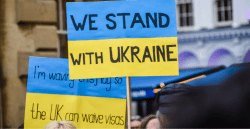TEN WAYS TO GET STARTED PART #1
Because human trafficking is a hidden and complex issue, accurate statistics are difficult to establish; however, it is estimated that nearly 36 million around the world are victims of modern-day slavery. Be aware that this dark and ominous problem is not just an issue in other countries. It is also a very real issue right here in our own back yard. Every state is struggling to find solutions and to prevent the atrocities from spreading. According to the U.S. Justice Department’s recent estimates, more than 40 percent of all human trafficking incidents opened for investigation in the United States involved sexual trafficking of a child. And the overwhelming majority of these victims – more that 80 percent of them – were identified as U.S. citizens.
As you learn more about modern slavery, you may start wondering what you can do to help. The truth is that everyone has the tools at their fingertips to do their part. Here are ten easy ways to get involved in the Movement.
- Inform yourself. Learn, read, ask questions! Be especially informed about the red flags that indicate and identify victims of human trafficking. Once you are educated, you can pass information along to others. Get basic information about modern slavery here: https://www.endcrowd.org/why-slavery
- Report a tip. If you suspect potential trafficking activity or know of a possible victim here in the U.S., contact the National Human Trafficking Resource Center at 1-888-373-7888 (FREE, 24/7). You may also submit an online tip at www.ice.gov/tips. If you are traveling abroad and become aware of a possible trafficking situation, you can contact the US State Department or the US Embassy. Trafficking can occur right in your neighborhood–massage parlors, hotels, truck stops.
- Shop smart. Become keenly aware of your own consumer habits. Determine your Slavery Footprint (http://slaveryfootprint.org/), and visit the Department of Labor’s List of Goods Produced by Child Labor or Forced Labor (http://www.dol.gov/ilab/reports/pdf/TVPRA_Report2014.pdf). Few are aware at the number of slaves who suffer each time we purchase a product that involves trafficked victims. You may be shocked, but you can make a difference.
- Get information out. Encourage the inclusion of information about modern slavery into materials of any professional associations in which you are involved. Look for ways to get the word out in newsletters, bulletins, or local papers.
- Support local efforts. Become a member of a local anti-trafficking organization. If there isn’t one in your area, start one.
- Write or call your government representatives. Let them know you care about trafficking issues and ask them what they are doing to combat it in their districts. They work for you and should be willing to listen and respond.
- Distribute materials. Acquire materials from the Department of Health and Human Services or the Department of Homeland Security and distribute them in your community. Get permission to pass them out in your church or workplace.
- Volunteer. Consider becoming a victim outreach volunteer. Offer your own professional services–legal, nursing, counseling, writing, bookkeeping, office management, etc.–to an organization fighting slavery. Download our guide of organizations in your state: https://www.endcrowd.org/take-action/volunteer
- Donate. Give money or needed supplies to an anti-slavery organization. Many have lists of needed items or are willing to discuss their needs with you when you contact them. End Crowd works around the world to fight slavery, and you can help by donating here: https://www.endcrowd.org/donate
- Raise funds. Organize an event, campaign, or fundraiser and direct the money that is raised to fight slavery. You can start a fundraiser to support organizations in the field here: https://www.endcrowd.org/take-action/fundraise
“Life begins and ends the moment we become silent about things that matter.” Martin Luther King
Read more at the U.S. Department of State’s website http://www.state.gov/j/tip/id/help/







Freedom United is interested in hearing from our community and welcomes relevant, informed comments, advice, and insights that advance the conversation around our campaigns and advocacy. We value inclusivity and respect within our community. To be approved, your comments should be civil.